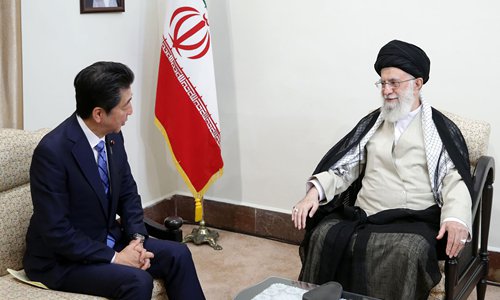HOME >> WORLD
Abe pledges ‘maximum role’
By Xie Wenting Source:Global Times Published: 2019/6/13 20:28:41
Japan’s efforts to ease US-Iran tensions to take some time

Iranian Supreme Leader Ayatollah Ali Khamenei (right) talking to Japanese Prime Minister Shinzo Abe during a meeting in Tehran, Iran on Thursday. Photo: VCG
Japanese Prime Minister Shinzo Abe pledged on Wednesday to play a "maximum role" in easing tensions during his visit to Iran.Abe began his two-day visit to Iran on Wednesday. Analysts said that his mediation role to ease tensions between the US and the Islamic Republic won't have an immediate effect.
From its post-war history, Japan isn't good at being a mediator, and it doesn't have an influence in the Middle East. Another question for Japan is the ambiguous attitude of the US government.
On the one hand, the US has expressed willingness to negotiate with Iran while on the other hand, continues to pressure Iran.
Before his trip, Japanese media said Abe's visit hopes to leverage Japan's ties with Iran to help ease tensions, and that he is following the footsteps of his father, who visited Iran in 1983 to mediate conflicts between Iran and Iraq. This is also the first time in 41 years that a Japanese prime minister is visiting Iran.
Japan is one of Iran's major oil importers. Before the US targeted crude oil, Iran supplied nearly 5 percent of Japan's imports of the precious energy resource, according to the Japan Times. Japanese oil companies now have to deal with the heavy blow from US sanctions on Iran.
"We hope [the Japanese government] will make strenuous efforts so imports can be resumed," Takashi Tsukioka, who heads the Petroleum Association of Japan, said at a news conference, the Japan Times reported.
While Japan has suspended oil imports from Iran, Iranian President Hassan Rouhani said Abe had expressed interest in continuing to import the country's oil.
Abe also urged Tehran to play a "constructive role" in Middle East peace. Rouhani told Wednesday's media conference that he expects a positive change if the US stops economic pressure.
"If there are some tensions, they stem from America's economic war against Iran. When it stops we will witness a very positive change in the region and the world," AFP quoted Rouhani as saying.
A day ahead of his visit, Abe spoke with US President Donald Trump over the phone about the Iran situation. Relations between the US and Iran deteriorated after Washington withdrew from the Iran nuclear deal last year.
In an interview with BBC, Professor Robert Dujarric, head of the Institute of Contemporary Asian Studies in Tokyo, said that he thinks the chance of "brokering a deal" between Iran and the US are "close to zero."
Tobias Harris, an analyst at Teneo consultancy group, also noted to AFP that "While Japan has good relationships with countries on both sides, these relationships do not necessarily translate into influence."
Posted in: MID-EAST,ASIA-PACIFIC,EYE ON WORLD